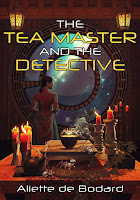I was in the fortunate position of having read almost all of the Hugo shortlisted novellas before the list of nominees on the ballot was announced. This meant that I didn't have much reading to do before writing this round-up, but on the other hand, some of the shortlisted books have faded a bit in my memory, since I read most of them very close to the release dates. So ranking these novellas, all of which I enjoyed, is going to be a bit tricky.
Before I get to the novellas, if this is the first of my Hugo round-ups that you're seeing, you might be interested in my round-up of Hugo shortlisted short stories, which I prepared earlier. Discussions of (some of) the other categories to come!
Before I get to the novellas, if this is the first of my Hugo round-ups that you're seeing, you might be interested in my round-up of Hugo shortlisted short stories, which I prepared earlier. Discussions of (some of) the other categories to come!
The full Hugo shortlist with links to my review of each novella is below, if you want to quickly scroll down to have a look at it. The list is in no particular order — I think I grabbed it from Tor.com — because it's quite tricky to rank these novellas, for a few reasons. Artificial Condition and Binti: The Night Masquerade are, respectively, a middle and final part of larger stories. Even though I very much like those stories (Murderbot 5eva), I'm not sure they work very well as standalone novellas, which they should for this award, in my opinion. In contrast, Beneath the Sugar Sky and The Tea Master and the Detective are both parts of ongoing series but stand alone perfectly well. Beneath the Sugar Sky has some characters recur from earlier novellas in the series, but is a fully self-contained story. The Tea Master and the Detective may have direct sequels or companion novellas in the future, but for the moment it is merely set in the same universe as many of the author's other stories (the overall series is also nominated for a Best Series Hugo Award). That leaves Gods, Monsters, and the Lucky Peach and The Black God's Drums as completely independent and self-contained stories (or at worst, self-contained first books in series, but I'm not sure on that last point).
But which book did I like best? It's currently a three-way tie between Beneath the Sugar Sky, Gods, Monsters, and the Lucky Peach, and The Tea Master and the Detective. Right now I'm leaning towards putting Beneath the Sugar Sky first, then tossing a coin for second and third, and for the remaining places. Once again, this is a very strong ballot and I wouldn't be disappointed by any of these novellas taking home the rocket trophy.
Artificial Condition by Martha Wells (Tor.com Publishing)
Beneath the Sugar Sky by Seanan McGuire (Tor.com Publishing)
Binti: The Night Masquerade by Nnedi Okorafor (Tor.com Publishing)
The Black God’s Drums by P. Djèlí Clark (Tor.com Publishing)
Gods, Monsters, and the Lucky Peach by Kelly Robson (Tor.com Publishing)
The Tea Master and the Detective by Aliette de Bodard (Subterranean Press / JABberwocky Literary Agency)













